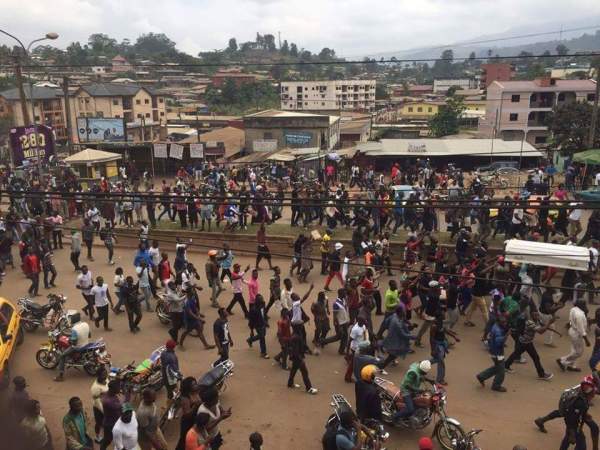People move, in motion, in politics, in themselves
21-26 September, Leiden
Impressions from Mirjam and Eefje, directors of the festival
Valséro, a critical and engaged artist from Cameroon, was right when he said: “We are all ‘people in motion’, and to understand why there are problems between us and them, let’s have a look in our own societies? Why do we do the way we do? We always search for outside explanations, but what if it is simply us?”He joined us at the festival because he was eager to think!
This was the best compliment we could expect to receive. The Voice4Thought festival is not merely a festival, it is meant to be a moment, a few days when people can meet, discuss current issues and share ideas on how matters could improve.
Opening
The opening ceremony on Wednesday 21 September at the Museum of Antiquities was a surprise [ ]. The opening dance choreographed by Ita was splendid. Joumana, Director of the Prins Claus Fund was touching in her speech . She revealed her personal story of movement and pointed out that we are moving in the world and need to keep on moving in order to shape that very same world. Her presence was special as both V4T and Prins Claus Fund share the ideology of exchange between art and academia.
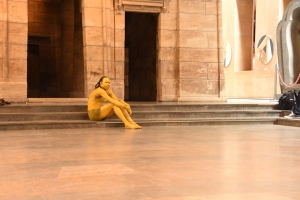
Dancer Yaya at the Museum of Antiquities
The dance of Yaya from Chad was the highlight of the afternoon. He was fascinating. Painted in yellow, he nearly struck fear into (the audience and staff at the museum) because his paint should not leave traces on the floor or on the beautiful temple in the middle of the hall. That temple and the danger in his performance made Yaaya flourish even more. It felt like he danced for us, and only for us.. and the experience was breathtaking. His dance was inspired by the Fulani, a nomadic people roaming all over the Sahel. Their freedom of mobility was overflowing from his dance.
The kind words of Aphroditi (LeidenGlobal) and Ton Dietz (ASCL) concluded the opening with spoken words and Didier, an exceptional and admirable talent from Chad, did the same with singing words. In the end guests, artists and members of the foundation had drinks together to mark the beginning of a week of amazing performances and experiences.
J’suis pas là pour contrer la bible mais confirmer qu’il est invisible
Que tu sois de l’Islam ne fait pas semblant de regarder le coran
Que tu sois du christianisme ne fait semblant de feuilleter la bible
Il faut le reciter pour mieux le métriser
Il donc la lire pour éviter le pir
Ohlé ohlé ohlééééé
Juste la paix, la paix qu’il nous a donnée
Juste l’amour, l’amour qu’il nous a laissé
DIDIER, Juste la paix
Youth participation
The conference of the pupils from a Leiden-based school resulted in a very enjoyable film. It showed how stereotypes often define the other and how all of us make assumptions which most often do not coincide with reality. The pupils’ interpretation of ‘people in motion’ was one of searching for the other in society and especially why and how we define the other. Some of the movie’s participants were astonished by their own beliefs about the other, and they realized that what they perceive is not per se who the other really is. After all, we are us/ourselves and the other at the same time.
# let’s talk: Being in motion; a debate
With this discussion we find ourselves at the heart of the ‘refugee problem’ and the way a society can and has to handle it. First of all, we define it as a problem. But for whom is it a problem and why? The panel discussion tried to turn the question around – refugees are not a problem, but instead they are at the center of the force of our society. History shows, as Irial Glynn, migration historian LU, explained in his opening lecture, that the contribution of migrants to our societies is immense and a world without migrants is unthinkable.
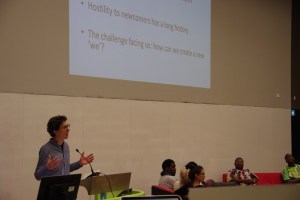
Dr. Irial Glynn at the beginning of the panel discussion
From the panelists we heard many hopeful stories, as they had all come from somewhere and have been successful in their own way. But the stories of Yemen (Rana), of Ivory Coast’s civil war (Amee), now a decade ago, the Mali conflict (Aziz), still puzzle policy-makers. Those panelists representing the ‘solution’ were not bringing forth very encouraging thoughts. Embracing African ideologies is far from the reality in Europe, and a successful business can only be a solution for few. Yes, indeed, we need to listen to the voices of ‘people in motion’ and Isaac’s story was moving. His call to listen actively and do something for his people, the pygmies in the forest of Congo, deeply illustrates the problems that we encounter daily, such as the complete denial of people’s rights and the rejection of migrants’ creativity and promising contributions to our society. Instead, we build borders and frontiers become of hard stone. The panel did ultimately reflect the reality of the world although its call for a listening ear aimed at the people in motion seems to be still a call in the dark.
Exhibition – Exposition In Movement
It all began with offering people the floor to present themselves and to show who they are.
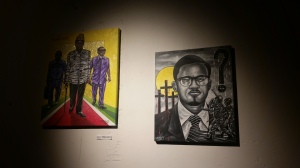
Artwork of Sapin Makengele
The exhibition which opened on Friday fulfilled exactly this objective. The pamphlets that were shown, made by Sjoerd Sijsma together with several researchers from Leiden University, are a presentation in themselves. Jomard, a refugee from Syria, shared a genuinely moving pamphlet in which he discloses the story of his itinerary from Syria and into Dutch society. The artworks of Zoe, Sapin and Cindy, displayed during this exhibition were an interpretation of movement both in political and geographical sense. References to the African continent, where political movements are increasingly influencing its societies, were at the center of these presentations.
#letswatch
In a week of various artistic expressions, a film cannot be absent. First we scheduled the film “Le Président” in which Valséro had a cameo appearance, criticizing the Cameroonian government while singing his song “Le président”. In the end, the final choice for a movie screening landed on “Stranded in Canton” presented by ASCL. The film, exploring the affairs of a Congolese entrepreneur in China was a beautiful addition to the stories of the ‘people in motion’. Prior to the projection, Lieve Joris read out aloud an intriguing excerpt from her book ‘Op de vleugels van de draak’. Both the book and movie presentation sparked a discussion among the audience and the evening was concluded with the possibility for networking and ideas exchange.
Collaboration
From 18th of September onwards, during the entire week, guest artists had been working on their repertoire. They were asked to collaborate with Dutch and ‘refugee’ artists. Together, the ‘people in motion’ managed to create emotion. The Friday evening concert began with the enchanting performance of the Iraqi group, led by Carolien on piano and Sattar on various instruments. Then, we listened to a delightfully presented spoken-word lyrics of Dutch origin, exclaimed by Mette and accompanied on guitar by Gosse. This was followed by a beauty story and the slam lyrics of Amee from Côte d’Ivoire and by the ambassador of slam Aziz Siten’k from Mali.
#letsdance
The Saturday concert, being the climax of the festival, made everyone initially a little bit nervous.
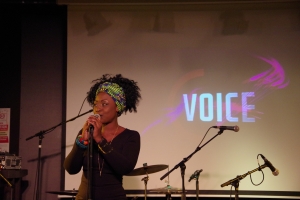
Bamba Aminata a.k.a. Amee
Its execution proved it to indeed be a climax. Croquemort creatively presented himself with the Band4Thought who played as well during the first edition last year. The band had meanwhile been in Tchad at Croquemort’s festival and a complete synergy between the group and the slam artist had been achieved. They had truly become a band. The performance was moving; e-motions remained no longer hidden. The other highlight was the song written by Ernst Jansz and based on the research work of historian Maartje Janse in which academy and art crossed paths.
Amee was again stunning, with the saxo, the piano and just herself. The closing act was Valséro, backed by Martijn, DJ and music producer from the Antilounge record label.
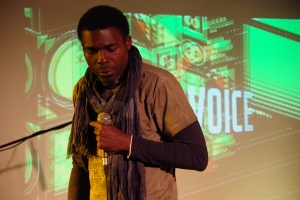
Political rapper Valsero
Together on stage, their synchronised performance was overwhelming. Valséro and his songs critique Cameroon and its regime, but simultaneously assess the world and the inequality in it. By and large, a very special man whom we hope to welcome back in the Netherlands.
The concert was exquisite, it showed new coalitions, real, tangible people in motion, people together, a new rencontre, new music. It brought the beginning of a possible future which only we can forge!
#Letswrite
The blog workshop on Saturday gathered together human and political rights activists, writers and researchers. It aimed to inspire and to encourage (potential) bloggers to share their unusual and sometimes harsh experiences and to find ways in which to convey the message properly.
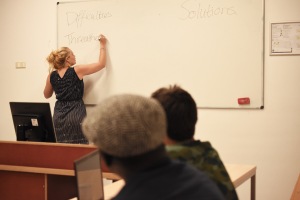
Blog workshop in progress
Being a blogger, Abel Maina tells, requires to verify your information and to conceive methods to engage your listeners either through social media channels or, like our cartoonists, through visual art. The V4T blog workshop’s motto is to ‘show the unseen, write about the untold’. No matter how challenging, the network of bloggers V4T has begun to establish sets out to support freedom of expression in any possible sense.
Reporting:
Some of the outcomes and proceedings of the festival are not that apparent at first and cannot be defined by a clear-cut physical event at a specific time. The mediation of the Internet and social media turned into visitors many more than only those who were “there” at “that” time. Furthermore, it expanded the meaning of being an artist as there were participants not fitting in the regular definition of the term.
From Thursday onward, the festival became the setting for reporters with critical minds who gave their interpretations of what they saw and experienced. Fils de Maina from the Chadian diaspora in Paris introduced the festival to an international audience through his live streaming and comments on all the events. The audience was stimulated to ask questions and give remarks through social media during and after the events thus simultaneously creating a valuable archive. This approach more than tripled the number of visitors of the festival which reached far beyond the physical boundaries of even Europe.
The Voice4Thought team themselves were reporting by means of social media and created a live blog on the V4T website, documenting in several media the highlights of the festival as they were occurring. A few engaged volunteers as well as professional photographers created a gallery of wonderful photos to capture all artistic production and people’s emotions.
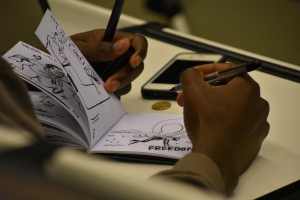
Cartoonist at work
And last but not least, the ninth Art was represented by the cartoonists Samy, Adjim and Augustine. They expressed their critical thoughts by drawing in more than one clever way and many times making hilarious analyses of our festival.
As the attack on Charlie Hebdo and the threats to several cartoonists in the past years has made it very clear, it has become a challenge to speak up and to delicately employ the freedom of expression. The cartoonists’ witty creations proved that this goal is obtainable and their subtle presence enlivened the whole festival.


 in several towns in this part of Cameroon that were met with violence by the State. Today, 12 December: A call is being made on the internet for declaring a Ghost Town in Southern Cameroon (see Facebook post); what will be the response? The essence of the argument in the protest is the imposition of the Francophone laws, teaching etc. on the Anglophones, a discourse that stands for so much more.
in several towns in this part of Cameroon that were met with violence by the State. Today, 12 December: A call is being made on the internet for declaring a Ghost Town in Southern Cameroon (see Facebook post); what will be the response? The essence of the argument in the protest is the imposition of the Francophone laws, teaching etc. on the Anglophones, a discourse that stands for so much more.